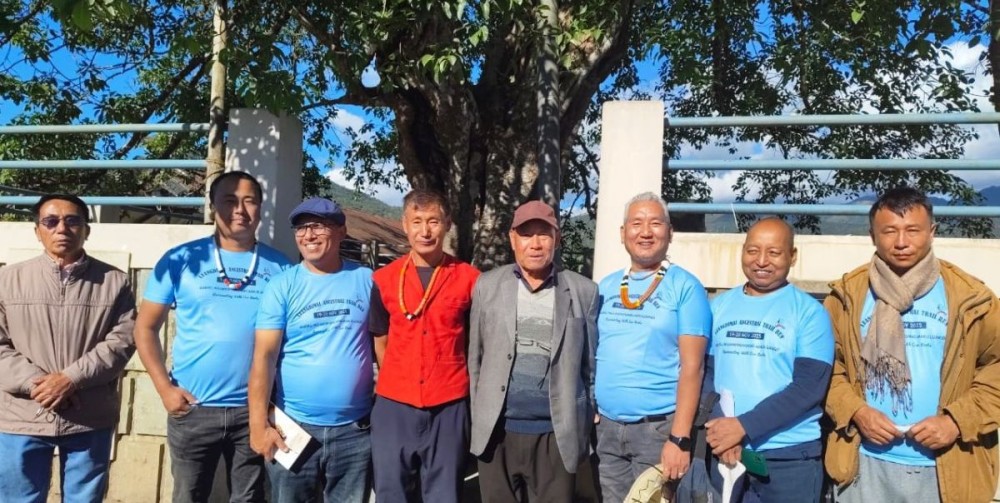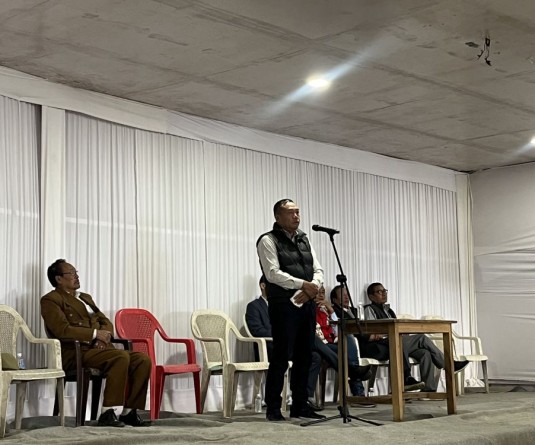Ndang with president Mao Council, Chief of Makhel village and chairman Makhel village authority and others.

Kohima, November 22 (MExN): K Elu Ndang, Convenor, Central Organising Committee Makuiluangdi Festival 2025 said that Makhel village is not just geographically significant, but spiritually central to the Naga people.
He said this during Makuiluangdi Festival 2025, held from November 18 to 21 under the theme “Malanwangbo: Return of the Native.”
The re-enactment of the Naga dispersal at Makhel, featuring a symbolic procession co-hosted by the Mao Council on November 18.
Following this, as part of the journey to rediscover the history and lineage of the Luangdimai (Zeliangrong), the organizers have planned an Ultra Trail Expedition—comprising running, cycling,
motorbiking, and car rally—from the Naga’s common ancestral home, Makhel, to Makuiluangdi Village (present Senapati District of Manipur).
The route marks the legendary path where the ancestors are believed to have traversed, took shelter and first settled and then finally established the Makuiluangdi civilisation.
This expedition is not only a tribute to ancestral memory but also a celebration of adventure, fitness, fellowship, and cultural pride among participants and enthusiasts.
The ancestral Trail Run was flagged off at Makhel by N Athiko Joseph, President Mao Council.
The main programme of Makuiluangdi Festival 2025 was held at Makuiluangdi Village.
Makuiluangdi Festival stands as a beacon of unity among the Zeliangrong/Luangdimai people, reaffirming the values of kinship and cultural tribe.
Makhel- the ancient cradle of our civilization, a site that anchors us to our past and guides our future. We are here, brought together by the guiding force of our ancestors, a call to heal the present and own the future, under the profound idea of the: “Return of the Native.” This call to return is not a simple invitation; it is a deep, spiritual imperative. In a time of immense change and challenge, particularly for our people here in Manipur, this homecoming to Makhel feels more urgent, more sacred, than ever before, Ndang said in his keynote address during the festival.
He said that “the return to Makhel” is a call for a triple return-a journey we must undertake with courage and conviction.
First, it is a Return to Our Roots of Unity. Here at Makhel, we are reminded that before we became different tribes or districts, we were one people. The stones here do not speak of separation, but of a shared origin, he said.
In a present-day Naga society that often feels fractured, our return to this spot is a powerful act of remembrance. We remember that our strength was never found in isolation, but in our inherent, historical unity as the descendants of a common ancestor. We return to this memory to find the strength to heal, to bridge divides, and to reaffirm the bonds that are older than any contest or conflict, he said.
Our culture-our languages, our warrior ethos, our respect for elders, our traditional governance, our vibrant weaves and fierce songs—is the fortress that has protected our identity for centuries, Ndang said.
He stressed on the need to fortify it by speaking “our mother tongues to our children, by practicing our rituals with deeper understanding, and by wearing our attire not just as fashion, but as a declaration of our existence. For the Naga people, this cultural return is not merely a celebration; it is an act of resilience and preservation.”
He said that a Naga native who returns is not a spectator but a native with a burden, a purpose and a responsibility.
He said that the future of our people depends on “your groundedness and your vision.”
“Our return to Makhel today is a pledge. A pledge to unitedly protect the sanctity of this land. A pledge to be keepers of our brothers and sisters. A pledge to ensure that the story that began here does not falter, but grows stronger with each passing generation,” Ndang said.
Let us carry the spirit of oneness and love of Makhel back to our villages, our towns, and our communities. Let us be living examples of the unity, resilience, and unwavering identity that this it represents, he said.
May this homecoming to Makhel ignite a fire in each of us-a fire that will light our way forward, a fire that will warm our homes, and a fire that will announce to the world that the Naga spirit, born here in Makhel, will never be broken, but proudly instilled in our hearts forever, he added.




